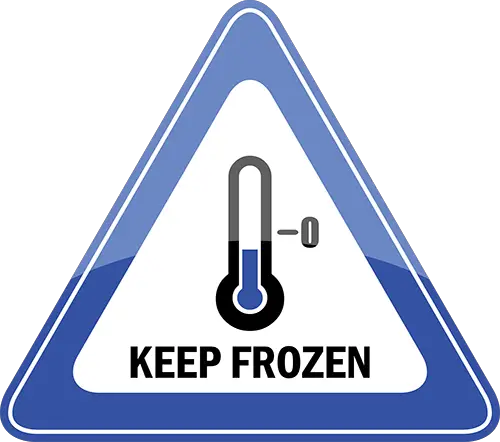Can You Freeze Cheddar Cheese? ( YES…Here’s How!)
One of the most popular cheeses in the United States, cheddar cheese is a rich source of vitamin K, vitamin A and iron. Be it scrambled eggs, melted grilled cheese sandwiches, or homemade macaroni, this delicious cheese varietal can add tangy and complex flavors to anything.
But can you freeze cheddar cheese? Yes! Cheddar cheese can be frozen for up to six months if you do it the RIGHT way.
Stick till the very end of this article as I discuss how cheddar cheese can be frozen, talk about the various types of cheeses that should and should not be frozen plus share some expert tips along the way!

Freezing and Thawing Cheddar Cheese: Step-by-Step
Freezing cheddar cheese is actually quite simple. The same process can also be applied to any other type of cheese, given you know how long it can be frozen.
In general, hard cheeses with low moisture content like cheddar, parmesan, and grana-padano can last up to 9 months in the freezer. Soft cheeses like mozzarella or feta cheese can be frozen for up to 4-5 months.
Now let’s talk specifically about how to freeze cheddar cheese:
What Types of Cheddar Cheese Can Be Frozen (Blocks, Grated, Sliced)
Depending on how you will want to use the cheddar cheese once it has been frozen and thawed, you may want to freeze blocks of cheddar cheese, grated cheddar cheese, or slices of cheddar cheese. The good news is that all forms of cheddar cheese can be frozen.
The only limiting factor here is that you shouldn’t freeze a block of cheddar cheese bigger than about 2lbs. This is essential to reduce the chances of dry air getting into the cheese and causing freezer burn.
Plus, the larger the block of cheese, the more time-consuming and difficult it is to thaw and use later.
Freezing Cheddar Cheese
Once you have diced, sliced, or shredded the cheddar cheese into smaller pieces, put it back in its original packaging (if sealable and airtight) or use a freezer-safe ziploc bag to store the cheese. If the cheese blocks are smaller in size, then you can use parchment paper/ cheese paper to separate the slices/pieces so that they do not stick together.
After being wrapped, the cheese should be transferred into a second air-tight container that prevents it from getting dry. This is also crucial if you want to avoid freezer burn.

Rapidly freeze the cheese and bring the temperature down to at least 15 degrees Fahrenheit (-9 degrees Celcius). This is done to stop the formation of big and disruptive ice crystals on the cheese surface.
You can also use the ‘quick freeze’ setting if your freezer has one. In this manner, you can store cheddar cheese for six months. Be sure to keep checking it and never use it if it starts to smell foul or shows discolouration/ soggy texture in certain areas.
Thawing Cheddar Cheese
In order to thaw frozen cheddar cheese, transfer it from the freezer to the middle section of your refrigerator and let it sit there 6-8 hours or, better yet, overnight. If you are using shredded cheddar cheese, then you can skip the thawing process and add it directly into pizza toppings, sandwiches, etc. as it will thaw out quickly.
After thawing, you can temper the cheese by keeping it in the lower shelf of the fridge so that it regains its freshness to some extent.
It is important to note that even if you freeze cheddar cheese with full precautions and use air-tight containers, frozen items seldom taste like their fresh counterparts. Frozen cheddar cheese will be best used in dishes where texture is not the main determinant.
Benefits of Freezing Cheddar Cheese
The water content inside cheese varies by variety. This also alters the time required to freeze a certain kind of cheese. The higher the water content, the quicker the cheese will freeze. For ex: Cottage cheese freezes at 20 degrees Fahrenheit (-1.2 degrees Celsius), whereas cheddar cheese needs a temperature of 9 degrees Fahrenheit (-12.9 degrees Celsius) before it will freeze.

Since the structure of cheese is quite porous, small ice crystals will form on the inside as it starts to freeze. This does not deplete any nutrients but instead affects the texture.
When we take it out of the freezer, the water inside those crystals melts, causing the surface to become dry. Thus, frozen cheddar cheese develops a slightly mealy texture when thawed.
Aside from the advantage of increased shelf life, freezing cheddar cheese also deactivates all the microbes such as bacteria, mold, and yeasts, preventing it from going bad. It is worth noting that freezing only de-catalyzes the bacterial growth for a while and doesn’t stop it altogether. On the flip side, freezing prevents cheddar cheese and other cheeses from ripening, decreasing the likelihood of spoiling.
While there are several benefits to freezing cheddar cheese, it’s important to be aware that frozen cheddar cheese isn’t as versatile as fresh cheese. In other words, you may not want to eat it by itself as the texture won’t be as good as it was before it was frozen.
It will, however, work and taste great when included in cooked dishes with other ingredients.
Best and Worst Cheeses to Freeze
Not all cheeses freeze well. Semi-hard cheese freezes quite well, whereas freezing creamier cheeses results in a watery, grainy texture. Frozen cheeses are better for cooked dishes instead of fresh dishes like a salad.
| Cheeses That Freeze Well | Cheeses That Freeze Poorly |
| Cheddar Gouda Swiss Emmental Colby Jack Mozzarella Parmesan Feta | Brie Cream cheese Stilton Ricotta Cottage cheese Low-fat cheese Paneer Queso fresco |
FAQ
Now that you know how to freeze cheddar cheese, here are some common questions about freezing cheese in general:
Can Sliced Cheddar Cheese Be Frozen?
Pre-sliced cheddar cheese can be frozen in the packaging it comes in. It can also be stored in a plastic freezer bag with parchment paper between each slice.
Can You Freeze Cheddar Cheese Cubes?
Cheddar cheese cut into cubes is okay to freeze. Like all cheeses, you will want to place it into an airtight container or freezer bag before placing them in the fridge.
Can You Freeze Grated Cheddar Cheese?
Grated Cheddar cheese will freeze well. Place the grated cheddar into an airtight zip lock bag (making sure to press out any excess air) before adding it to the freezer.
Does Freezing Cheese Change its Flavor?
In most cases, freezing cheese does not alter the flavor but rather affects the texture. Post-freezing, cheese typically gets drier, mealy, and more crumbly.
How Long Can Frozen Cheese Last in the Fridge?
Most frozen cheeses can last in the fridge for 6-9 months. For the best taste, try to consume it within 3 months and use parchment papers between pieces or slices of cheese before freezing so that they do not stick together.






